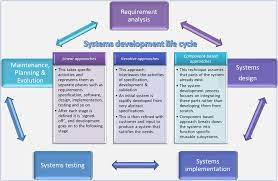Exploring the Latest Innovations in Software Development Tools
The Essential Software Development Tools Every Developer Should Know
Software development tools are essential for developers to create, test, and deploy applications efficiently. With the ever-evolving technology landscape, staying updated on the latest tools is crucial for success in the field of software development.
Integrated Development Environments (IDEs)
IDEs are comprehensive software applications that provide developers with all the necessary tools to write, test, and debug code. Popular IDEs like Visual Studio, IntelliJ IDEA, and Eclipse offer features such as code completion, syntax highlighting, and version control integration.
Version Control Systems
Version control systems like Git and SVN help developers track changes to their codebase, collaborate with team members, and revert to previous versions if needed. These tools play a crucial role in maintaining code integrity and streamlining the development process.
Testing Frameworks
Testing frameworks such as JUnit for Java or Jest for JavaScript enable developers to write automated tests to ensure the functionality and reliability of their code. By automating testing processes, developers can identify bugs early in the development cycle and deliver high-quality software.
Containerization Tools
Containerization tools like Docker allow developers to package applications and their dependencies into lightweight containers that can run consistently across different environments. Containers streamline deployment processes and improve scalability and portability of applications.
Continuous Integration/Continuous Deployment (CI/CD) Tools
CI/CD tools such as Jenkins and Travis CI automate the build, testing, and deployment processes of software development. By integrating these tools into their workflow, developers can accelerate delivery cycles, reduce errors, and ensure a seamless deployment pipeline.
Code Editors
Code editors like Visual Studio Code, Sublime Text, and Atom provide developers with lightweight yet powerful environments for writing code. These editors offer features such as syntax highlighting, code snippets, and extensions that enhance productivity during development.
In conclusion, software development tools play a vital role in empowering developers to build robust applications efficiently. By leveraging the right tools for each stage of the development process, developers can streamline workflows, collaborate effectively with team members, and deliver high-quality software products that meet user expectations.
9 Common Questions About Software Development Tools and Their Importance
- What are software development tools?
- Why are software development tools important in the software development process?
- What are some examples of popular Integrated Development Environments (IDEs)?
- How do Version Control Systems benefit software developers?
- What role do Testing Frameworks play in software development?
- How can Containerization Tools help in application deployment?
- What are Continuous Integration/Continuous Deployment (CI/CD) Tools and why are they important?
- Which Code Editors are commonly used by developers for writing code?
- How can developers choose the right software development tools for their projects?
What are software development tools?
Software development tools encompass a wide range of software applications and platforms designed to assist developers in creating, testing, and deploying software solutions. These tools provide developers with functionalities such as code editing, debugging, version control, testing automation, and deployment management. By utilizing software development tools, developers can streamline their workflow, collaborate effectively with team members, ensure code quality and reliability, and ultimately deliver successful software projects that meet user requirements.
Why are software development tools important in the software development process?
Software development tools are crucial in the software development process for several reasons. These tools provide developers with the necessary resources to write, test, debug, and deploy code efficiently. By using integrated development environments (IDEs), version control systems, testing frameworks, and other tools, developers can streamline their workflows, collaborate effectively with team members, and ensure the quality and reliability of their code. Software development tools also help automate repetitive tasks, identify bugs early in the development cycle, and improve overall productivity. In essence, these tools play a fundamental role in empowering developers to create high-quality software products that meet user requirements and industry standards.
What are some examples of popular Integrated Development Environments (IDEs)?
When it comes to popular Integrated Development Environments (IDEs), developers have a variety of options to choose from based on their programming language preferences and project requirements. Some well-known IDEs include Visual Studio for .NET development, IntelliJ IDEA for Java development, Eclipse for multi-language support, and Xcode for iOS and macOS development. These IDEs offer a range of features such as code completion, debugging tools, version control integration, and plugin support to enhance developers’ productivity and streamline the software development process.
How do Version Control Systems benefit software developers?
Version Control Systems (VCS) offer significant benefits to software developers by enabling them to track changes to their codebase, collaborate effectively with team members, and maintain code integrity. With VCS like Git or SVN, developers can easily manage different versions of their code, making it simple to revert to previous versions if needed. This feature is crucial for debugging and ensuring the stability of the codebase. Additionally, VCS facilitates seamless collaboration among team members by providing a centralized platform for sharing and merging code changes. By using version control systems, software developers can work more efficiently, reduce errors, and enhance overall productivity in the software development process.
What role do Testing Frameworks play in software development?
Testing frameworks play a crucial role in software development by enabling developers to automate the process of testing code for functionality and reliability. These frameworks provide a structured approach to writing and executing test cases, allowing developers to identify bugs and errors early in the development cycle. By incorporating testing frameworks like JUnit or Jest into their workflow, developers can ensure that their code meets quality standards, improve the overall stability of the software, and deliver a more robust product to end-users.
How can Containerization Tools help in application deployment?
Containerization tools play a crucial role in application deployment by simplifying the process and ensuring consistency across different environments. Tools like Docker allow developers to package applications along with their dependencies into lightweight, portable containers. These containers encapsulate everything needed for the application to run, making it easier to deploy the application on various platforms without worrying about compatibility issues. By using containerization tools, developers can streamline deployment processes, improve scalability, enhance security, and achieve greater flexibility in managing and deploying applications effectively.
What are Continuous Integration/Continuous Deployment (CI/CD) Tools and why are they important?
Continuous Integration/Continuous Deployment (CI/CD) tools are essential components in modern software development practices. CI/CD tools automate the process of integrating code changes into a shared repository, running automated tests, and deploying applications to production environments. By streamlining these processes, CI/CD tools help developers catch bugs early, ensure code quality, and accelerate the delivery of software updates. This automation reduces manual errors, improves collaboration among team members, and enables faster feedback loops, ultimately leading to more reliable and efficient software development cycles. In today’s fast-paced development environment, CI/CD tools are crucial for maintaining a competitive edge and delivering high-quality software products to users in a timely manner.
Which Code Editors are commonly used by developers for writing code?
Code editors are essential tools for developers to write and edit code efficiently. Some of the most commonly used code editors in the software development community include Visual Studio Code, Sublime Text, and Atom. These editors offer a range of features such as syntax highlighting, code completion, and customizable themes that cater to the diverse needs of developers. Visual Studio Code, known for its versatility and extensive extension library, has gained popularity among developers working with various programming languages. Sublime Text is favored for its speed and simplicity, while Atom is appreciated for its open-source nature and ease of customization. Ultimately, the choice of code editor often comes down to personal preference and the specific requirements of a developer’s workflow.
How can developers choose the right software development tools for their projects?
When it comes to choosing the right software development tools for their projects, developers should consider several key factors to ensure optimal outcomes. Firstly, developers need to assess the specific requirements of their project, such as the programming languages, frameworks, and technologies involved. Understanding the project scope and objectives is crucial in selecting tools that align with these needs. Additionally, developers should evaluate the scalability, flexibility, and compatibility of tools to ensure they can accommodate future growth and changes in project requirements. Collaboration capabilities, community support, and ease of integration with existing systems are also essential considerations when choosing software development tools. By conducting thorough research and testing different tools based on these criteria, developers can make informed decisions that enhance productivity and streamline the development process for their projects.





